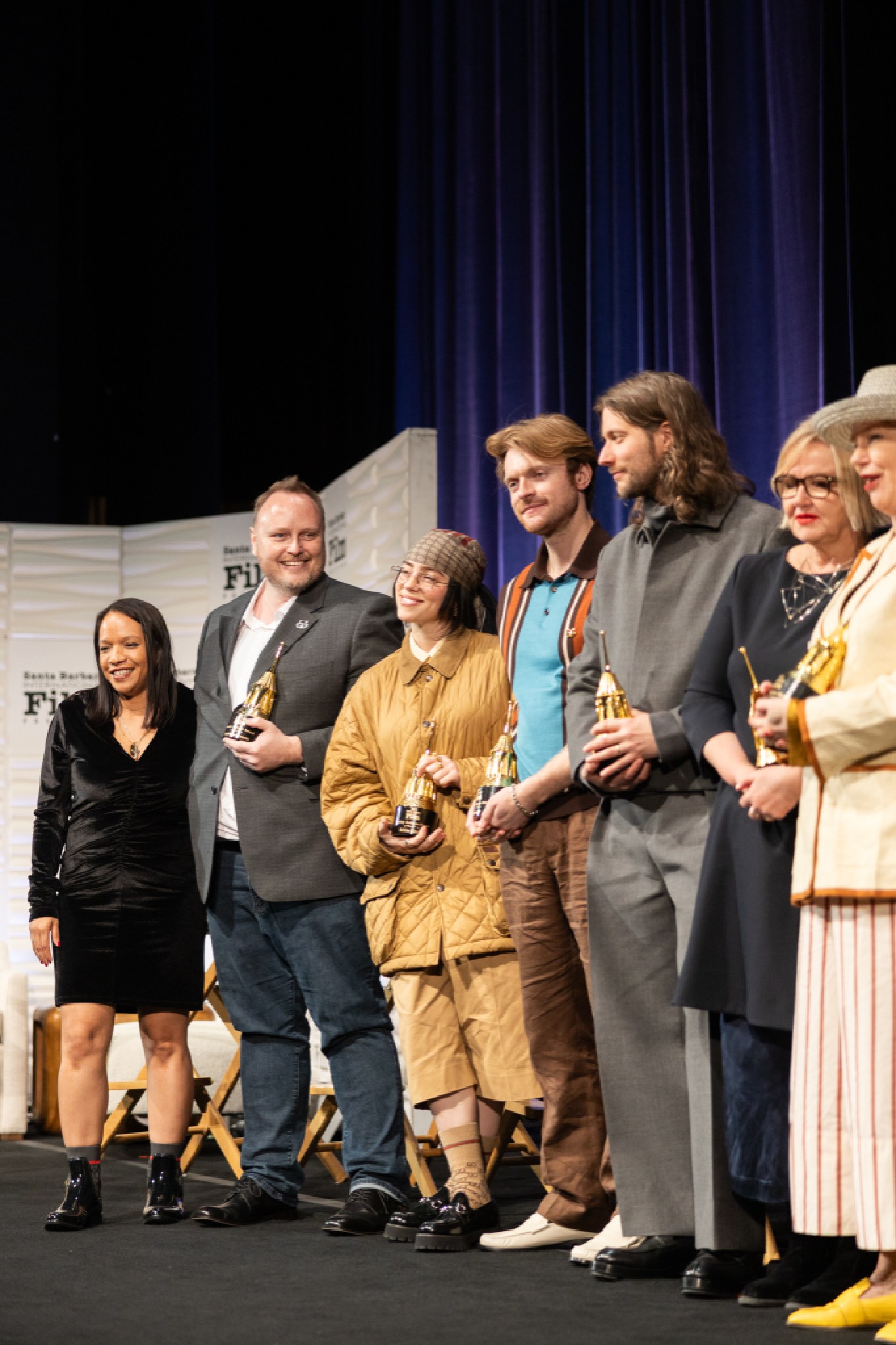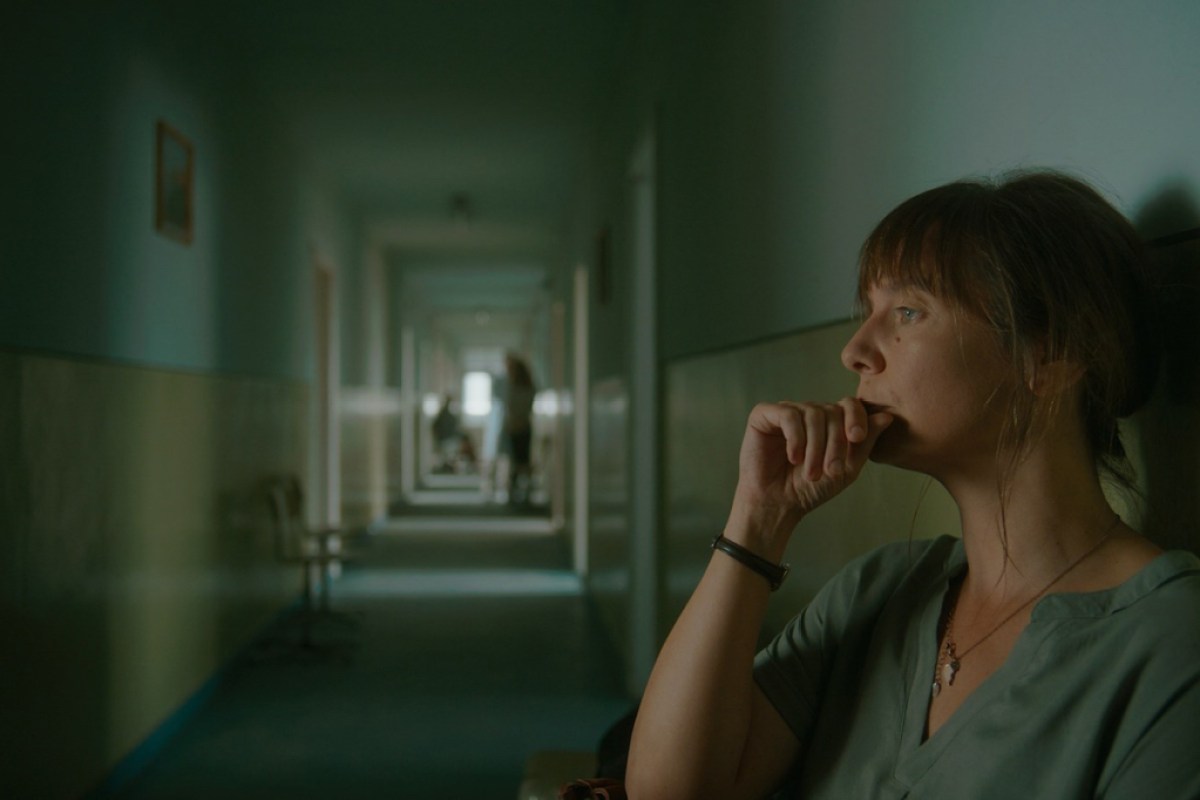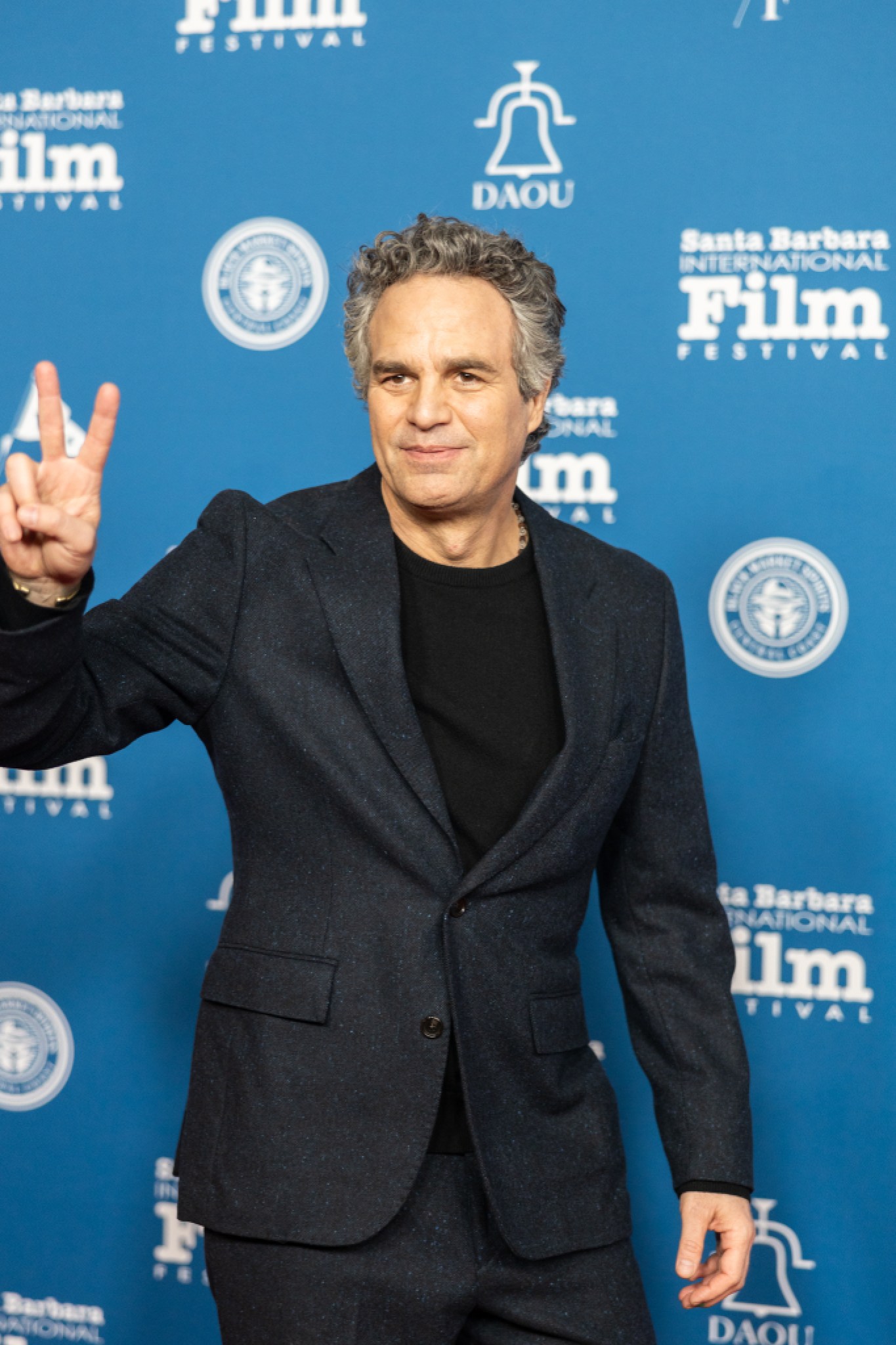Irish Transcendence, Hungarian High, Palestinian Wake-up Call, and Billie Eilish in the House/Town
Another Full, Varied, and International Day at SBIFF Ends with Sobering Wake-Up Call

So I’m just sitting in the Cajé Coffee House across the street from the Arlington Theatre, minding my own business and doing some writing. Suddenly, a stentorian swarm of screaming young folks pierce the air. Yes, Billie Eilish has arrived, the reason that this year’s 10th annual Variety Artisan Awards event has very much sold out, whereas the event has previously been more of a specialized — and important — film geek affair on the SBIFF calendar.
As she greets her rabid crowd of fans and meanders down the red carpet line with her brother/creative partner Finneas, Cajé paid its respects by pumping Eilish songs loudly on its outdoor speakers. Eilish fever effectively invaded State Street.
A few points towards my own particular interests and obsessions related to the Billie/Finneas charmer “Barbie” song, basking in Oscar nomland just after the pair scored at the Grammy Awards a week earlier: the inspired cinematographer Rodrigo Prieto, there for Killers of the Flower Moon but also lending his keen eye to Barbie last year, and the playscape geniuses Sarah Greenwood and Katie Spencer, production designers for the dreamhouse horseplay for Barbie (as they said “a set doesn’t live until the cast steps on it,” thence beginning “the joy of the toy”).
Eilish, the only panelist opting to sit in lotus position on the big couch, was down-to-earth and relatable as usual (she even responded to a heckler’s shout out of “will you marry me?” with “sure, man”). She explained that the Oscar-nommed Barbie song (which opens with the key line “I used to float/now I just fall down”), was a song that “picked me up like a little hook, lifting me out of a dark place.”
Prieto gave a fascinating explanation of his research of vintage film stocks and looks in designing the shifting visual scheme for Killers and spoke of working with Martin Scorsese: “he speaking in not so technical terms, but talks about the feel of a shot. He might say ‘it needs to be more extreme ….’ I’ve learned to translate what he wants.”
If SBIFF secretly has an allotted slot for the genre of slow, quiet, yet deep films about rural Ireland — a description beautifully realized with last year’s The Quiet Girl — this year’s model would have to be the unique and luminous film That They May Face the Rising Sun, which had its North American premiere in Santa Barbara. In the right viewer mind state, being open to time’s passage, idyllic nature, and reflections thereupon, the film is hypnotic from its first scene to its last. The lush green landscape and sense of remote Irish life before even landline phones were common doesn’t hurt in the process.
Director Pat Collins has done a masterful job in this adaptation of a well-known John McGahern novel of the same name. He has sometimes been dubbed the Irish Chekhov and about whom Collins made a documentary, subsequently clinging to Collins’s notion of putting the book on film for years. In the slow-brew tale of a writer and his wife who relocate from London’s bustle back to their homeland of Ireland — and a small, thinly populated farming community at that — not much happens and yet life happens in ample supply.
Older citizens of varying eccentric color pop by for a drink and a chat, often involving gossip and gentle backbiting about their beloved town folk. Meanwhile, the writer protagonist (the handsome and compassion-imbued Barry Ward) builds his book around the town’s cast of characters, the nature and its seasonal changes and such ephemeral observations as “these days would be looked back on as happiness.” The respectfully treated source material, potent yet nuanced acting, a simple piano-based score, and patient imagery of the lakeside Northwestern Irish terrain adds up to a small but profound cinematic wonder.
In a post-screening Q&A, Collins spoke about the importance of taking time to get things right in the adaptation, including respecting the four seasons so elemental to McGahern’s story. “Time passing is a major theme and you had to do the novel justice,” he told the audience at the Metro 4, “it had to have the passing of time and the seasons.” He later offered that “I go to cinema to see a film as a place, like going to church.” SBIFF, at its best, fulfills a similar secular sanctuary function, as was the case while watching this Irish jewel.

From the Breakfast Club corner of SBIFF’s earliest screenings, the prized item on the Sunday 8 a.m. menu was Without Air, a Hungarian film reminding us of the special creative powers from the too-rarely seen or widely distributed zone of Eastern European cinema. It is also a zone paid some due respects and screentime in the tradition of SBIFF going back to the festival’s beginning 39 years ago.
Director Katalin Moldovai’s film about the inner workings and heated politics in a high school setting proceeds with a deceptively calm, engrossing quality until rationality gives way to ambiguous undoing. It tells a seemingly small tale in a small Hungarian city but conveys larger and more universal messages about the fragility of educational/institutional culture and censorship of educational processes. We can relate the specifics of parental-imposed disapproval of curriculum — in this case concerning a literature teacher’s recommendation of the gay-related film Total Eclipse — to recent situations even in Santa Barbara schools.
But that aspect of the film’s narrative, important and thematically driving as it is, gives way to more purely cinematic magic, Hungarian style. Linear narrative techniques slip into more poetic asides as the story deepens, and facts and details become less important than the sum cinematic effect before us. Things are not spelled out, and loose ends gather into areas of poetic suggestion versus easy answers or tidy resolutions. Without Air is a prime example of why we tend to zero in on the Eastern European contingent at SBIFF.

A SBIFF Sunday which began as a morning audience with a pop star of no small artistic ingenuity closed out with an “American Riviera Award” tribute at the Arlington to Mark Ruffalo (see Leslie Dinaberg’s full report here). The honor was tied to his gamey, love-to-hate-him role in Yorgos Lanthimos’ stunning film Poor Things, but was more generally a chance to honor a fine actor (and activist) whose filmography has lacked for ripe leading roles (not unlike SBIFF’s earlier tribute subject Robert Downey, Jr.) but has added up to a substantive body of work over the decades, from indie films to socially significant features (Spotlight, Dark Waters) and the cash cow of the Marvel Cinematic Universe.
Among his ripe observations during the interview was the point that “the trick of acting is to make it seem as if you’re improvising.”
An undeniably thrilling moment of the evening arrived in the form of the eminent (Emma-nent?) and utterly Oscar-worthy Emma Stone, on hand to send out her glowing appreciation of and hand the Riviera Award to her Poor Things comrade. In his acceptance speech, Ruffalo said all the right things, especially when he ended it by addressing an elephant in the global room.
“We can’t bomb our way into peace,” he said. “We can’t act like what’s happening isn’t happening. It’s a scary time. I want to state things that aren’t being talked about enough.”
At least in my exhaustive coverage of the festival thus far, this was the first acknowledgment of the horrific Palestinian crisis carrying on as we speak and enjoy the festival in a great American Riviera town. Bully for the Hulk.
Sun, Apr 28 6:00 PM
Santa Barbara
Thu, May 02 5:00 PM
Santa Barbara
Sat, May 04 10:00 AM
Lompoc
Sat, Apr 27 11:00 AM
Santa Barbara
Sat, Apr 27 3:30 PM
Santa Barbara
Sat, Apr 27 8:00 PM
Santa Barbara
Sun, Apr 28 11:00 AM
Santa Barbara
Wed, May 01 7:30 PM
Santa Barbara
Thu, May 02 5:00 PM
Santa Barbara
Thu, May 02 5:00 PM
Santa Barbara
Fri, May 03 4:00 PM
Santa Barbara
Fri, May 03 8:00 PM
Santa barbara
Sat, May 04 10:00 AM
Solvang
Please note this login is to submit events or press releases. Use this page here to login for your Independent subscription
Not a member? Sign up here.
You must be logged in to post a comment.